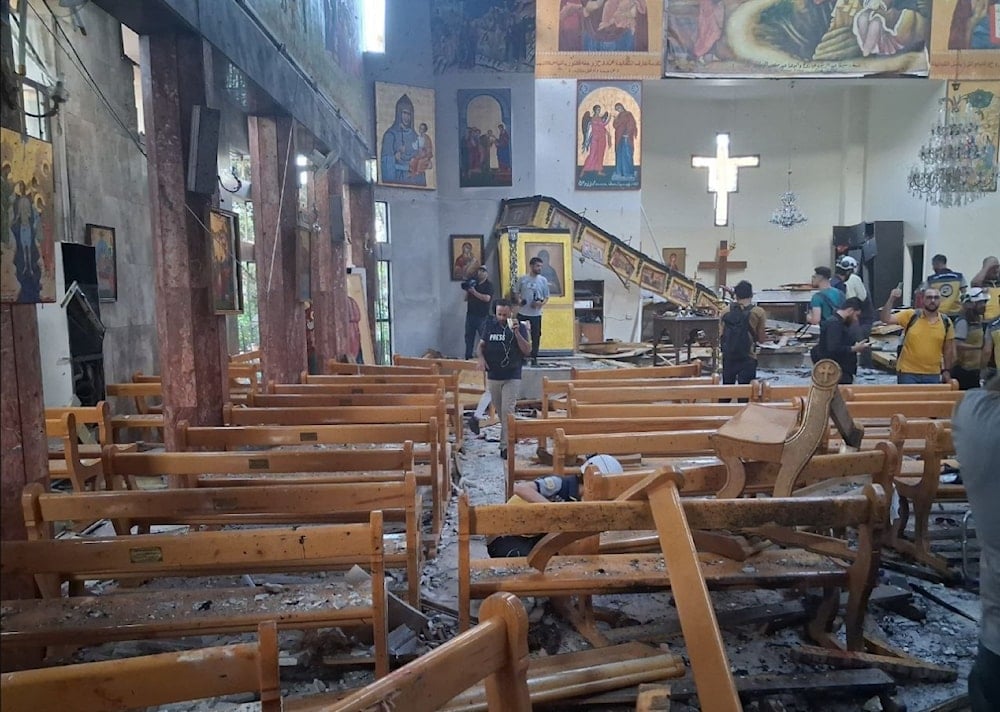Suicide bombing hits Church in Damascus during Sunday mass, 20 killed
Eyewitnesses said the attack targeted civilians gathered for prayer in what appeared to be a calculated act of terror.
-

SANA publishes initial photos of the aftermath of the suicide attack that targeted Mar Elias Church in the Douweila area of Damascus. (SANA)
A devastating suicide bombing struck a church in the Dweila district of Damascus on Sunday during a religious service, killing over 20 worshippers and reigniting fears of renewed sectarian violence in Syria. Eyewitnesses described the attack as a deliberate assault on civilians gathered in prayer, with one stating, "A terrorist detonated an explosive device at a church in Dweila during a service. Some people were killed," according to RIA Novosti.
The explosion, confirmed by Syria TV, occurred during mass at the Mar Elias Church. Initial reports suggested a general blast in the area, but it was later confirmed that the church was the direct target. The assailant reportedly detonated an explosive vest inside the building. Security forces swiftly cordoned off the site, but no group has claimed responsibility for the attack as of yet.
The bombing comes at a time of deep instability in Syria, where militant factions, particularly ISIS remnants, have gained ground amid the political vacuum left by the fall of the Assad government.
The country's new transitional administration, headed by interim President Ahmed al‑Sharaa, has presented itself as a force for national reconciliation. However, al‑Sharaa's background as the former leader of Hay'at Tahrir al‑Sham (HTS), an armed group previously aligned with al-Qaeda, continues to raise concerns about the depth and sincerity of his government's commitment to civilian protection and pluralism.
Although al‑Sharaa has publicly denounced sectarian attacks and ordered investigations into recent atrocities, questions persist. In March, more than 1,300 civilians, many of them Alawites and Christians, were killed in a wave of violence by factions loosely aligned with the transitional government. An official inquiry was launched, but international observers have criticized the process as opaque and inadequate.
Adding to the controversy, al‑Sharaa has reportedly opened indirect channels with Israeli officials, exploring potential normalization, a move unthinkable under previous Syrian leadership. Talks reportedly facilitated by Gulf states and involving US mediation have touched on regional security and the future of southern Syria. While al‑Sharaa has framed these efforts as pragmatic diplomacy aimed at regional de-escalation, the initiative has triggered backlash from both domestic constituencies and traditional allies.
Read more: New Syrian group claims Golan strike, vows resistance to 'Israel'
Despite the violence and political uncertainty, Western governments have recently eased sanctions against Damascus. The United States suspended enforcement of the Caesar Act for six months, and the European Union followed suit with broad economic relief, citing humanitarian concerns and the need to stabilize Syria's economy. Critics, however, warn that such moves risk legitimizing a leadership still haunted by ties to extremist networks and unable, or unwilling, to curb violence against minority communities.
🚨 Suriye'nin başkenti Şam'da Mar Elias kilisesine düzenlenen bombalı saldırı sonucu en az 30 kişinin hayatını kaybettiği 25 kişinin de yaralandığı bildirildi.
, Ayşegül Akyüz Yahşi (@aysegulakyuz50) June 22, 2025
Saldırganların bombayı patlatmadan önce uzun namlulu silahlarla kalabalığın üzerine ateş açtığı aktarıldı.
▪️ Suriye… https://t.co/1SCmfLHycf pic.twitter.com/uco9F6utGS

 3 Min Read
3 Min Read










